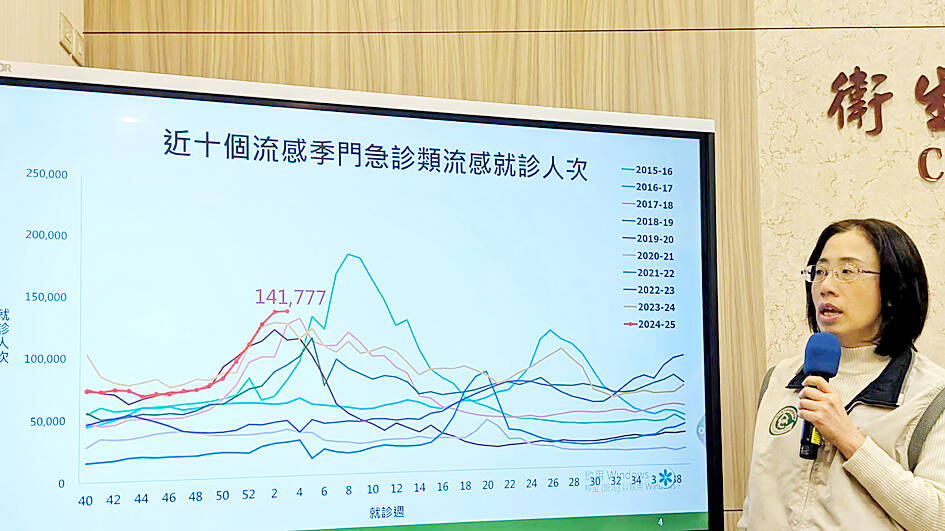Weekly hospital visits for flu-like illnesses last week were the highest for the period in 10 flu seasons, while the first case of infant botulism in Taiwan in four years was reported, the Centers for Disease Control (CDC) said yesterday.
CDC Epidemic Intelligence Center Deputy Director Lee Chia-lin (李佳琳) said there were 141,777 hospital visits for flu-like illnesses between Jan. 12 and Saturday, the highest for the week in 10 flu seasons.
The weekly number is projected to continue increasing, Lee added.

Photo: CNA
Sixty-four cases of severe flu were reported last week, with 90 percent having influenza A(H1N1), she said, adding that 86 percent of the people with severe flu were unvaccinated this flu season.
Six flu deaths were reported last week, she said.
Flu activity in Japan, South Korea, China and Hong Kong is high; while it is high and rising slightly in Europe; increasing in Canada; and reducing, but still above the epidemic threshold in the US, Lee said.
CDC physician Lin Yung-ching (林詠青) said the youngest of the people who died with the flu last week was a man in his 30s who was immunocompromised and unvaccinated.
The man was hospitalized for pneumonia and died of septic shock three weeks later, Lin said.
The youngest person with severe flu last week was a baby aged between six months and one year who had cold-like symptoms, he said,
The girl was hospitalized with low blood oxygen and pneumonia, and was being treated in an intensive care unit after spending more than 10 days in hospital, he said.
Meanwhile, a child under the age of one was diagnosed with botulism, the first case in the country in four years, Lee said.
The baby, who lives in northern Taiwan, does not have a congenital disease, but developed symptoms including constipation, loss of appetite and decreased vitality from Dec. 22, Lin said.
She was taken to a hospital for treatment on Jan. 4, Lin said.
The medical team initially suspected an intestinal obstruction or a congenital intestinal disorder, but examinations showed a deep tendon reflex disorder, droopy eyelids and limb weakness, while neuroimaging scans showed no brain abnormalities, he said.
Further tests detected Clostridium botulinum in her feces and she was diagnosed with infant botulism, Lin said, adding that she has been treated with an antitoxin and her symptoms have eased after being hospitalized for more than two weeks, although she is still in an intensive care unit.
The girl’s family said her diet is mainly breastmilk with some canned foods, such as fruit sauces and pureed vegetables, Lin said, adding that the local health department has collected samples of the canned food for testing.
C botulinum is widespread, usually found as spores, Lin said.
Honey is a typical culprit in contamination cases, he said, adding that the bacteria can produce a neurotoxin that causes botulism, with symptoms including blurred or double vision, drooping eyelids, difficulty speaking and swallowing, and muscle weakness.
It can be fatal if not treated promptly, he said.
The intestinal tracts of infants lack some protective bacteria and they have weaker immunity, so if they ingest the spores, the bacteria can colonize the intestine and produce a toxin, leading to botulism, he said.
Adults should avoid feeding honey to children younger than one, while fruits and vegetables should be thoroughly washed and their skins removed to negate possible contamination from soil, he said.
People should avoid eating canned food or food from jars when the lid has swollen, he added.

An essay competition jointly organized by a local writing society and a publisher affiliated with the Chinese Communist Party (CCP) might have contravened the Act Governing Relations Between the People of the Taiwan Area and the Mainland Area (臺灣地區與大陸地區人民關係條例), the Mainland Affairs Council (MAC) said on Thursday. “In this case, the partner organization is clearly an agency under the CCP’s Fujian Provincial Committee,” MAC Deputy Minister and spokesperson Liang Wen-chieh (梁文傑) said at a news briefing in Taipei. “It also involves bringing Taiwanese students to China with all-expenses-paid arrangements to attend award ceremonies and camps,” Liang said. Those two “characteristics” are typically sufficient

A magnitude 5.9 earthquake that struck about 33km off the coast of Hualien City was the "main shock" in a series of quakes in the area, with aftershocks expected over the next three days, the Central Weather Administration (CWA) said yesterday. Prior to the magnitude 5.9 quake shaking most of Taiwan at 6:53pm yesterday, six other earthquakes stronger than a magnitude of 4, starting with a magnitude 5.5 quake at 6:09pm, occurred in the area. CWA Seismological Center Director Wu Chien-fu (吳健富) confirmed that the quakes were all part of the same series and that the magnitude 5.5 temblor was

The brilliant blue waters, thick foliage and bucolic atmosphere on this seemingly idyllic archipelago deep in the Pacific Ocean belie the key role it now plays in a titanic geopolitical struggle. Palau is again on the front line as China, and the US and its allies prepare their forces in an intensifying contest for control over the Asia-Pacific region. The democratic nation of just 17,000 people hosts US-controlled airstrips and soon-to-be-completed radar installations that the US military describes as “critical” to monitoring vast swathes of water and airspace. It is also a key piece of the second island chain, a string of

The Central Weather Administration has issued a heat alert for southeastern Taiwan, warning of temperatures as high as 36°C today, while alerting some coastal areas of strong winds later in the day. Kaohsiung’s Neimen District (內門) and Pingtung County’s Neipu Township (內埔) are under an orange heat alert, which warns of temperatures as high as 36°C for three consecutive days, the CWA said, citing southwest winds. The heat would also extend to Tainan’s Nansi (楠西) and Yujing (玉井) districts, as well as Pingtung’s Gaoshu (高樹), Yanpu (鹽埔) and Majia (瑪家) townships, it said, forecasting highs of up to 36°C in those areas